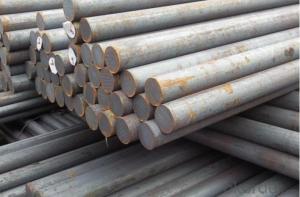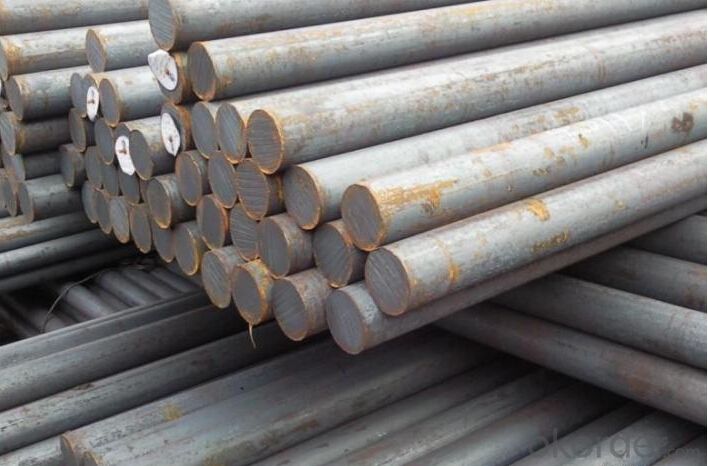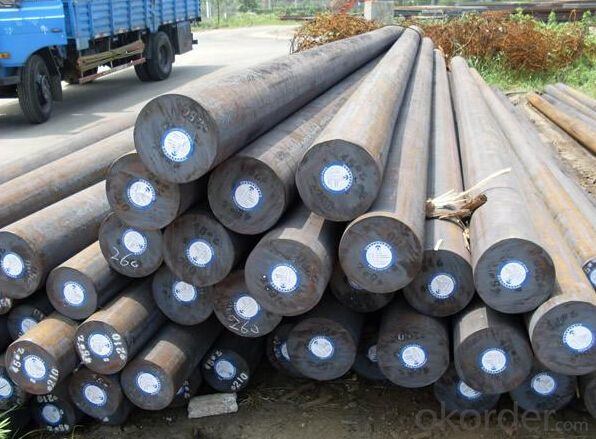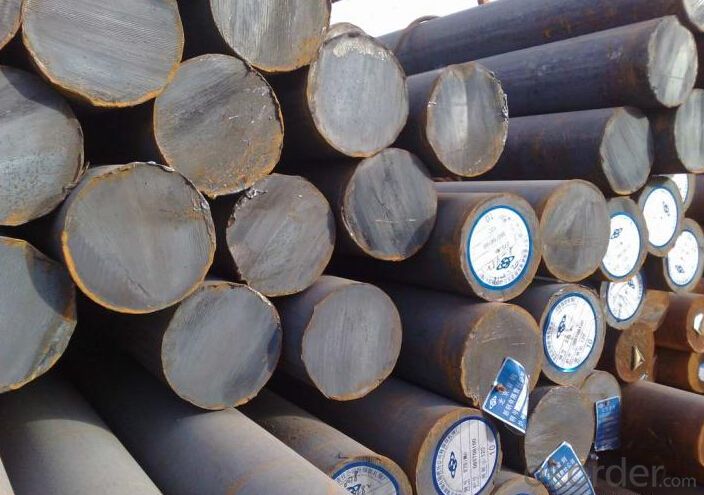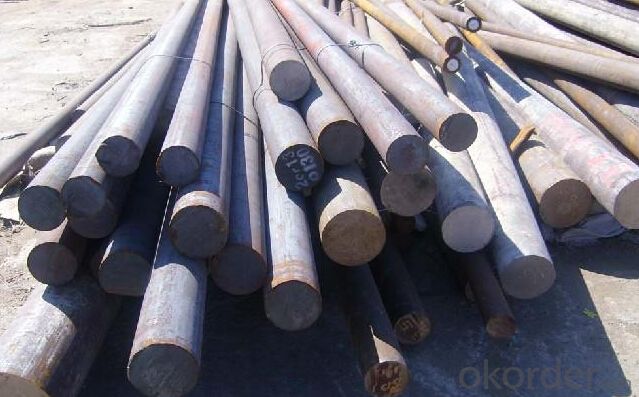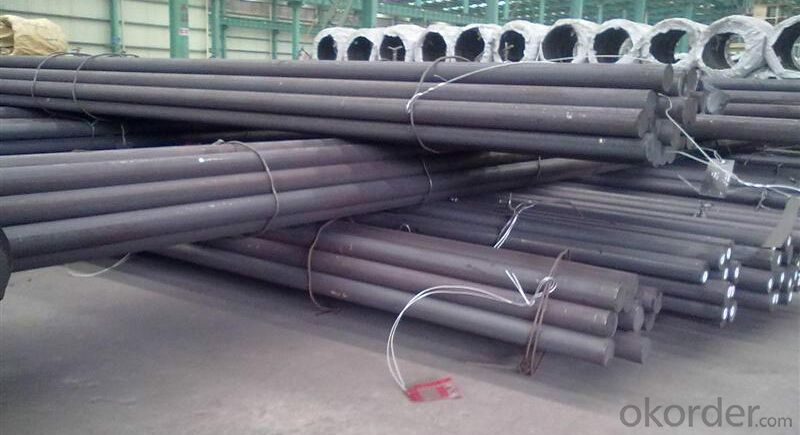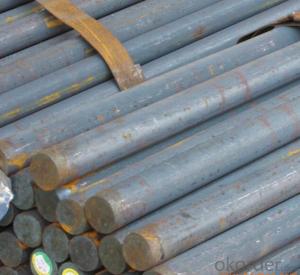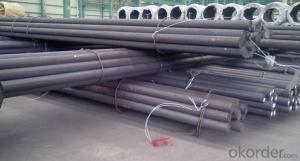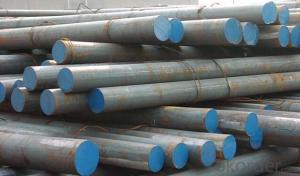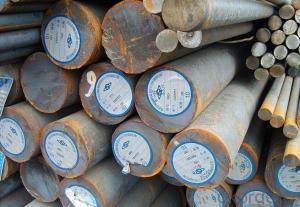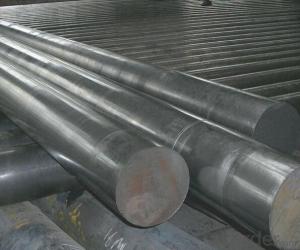Grade SAE A36 CNBM Carbon Steel Round Bar with High Quality
- Loading Port:
- Shanghai
- Payment Terms:
- TT or LC
- Min Order Qty:
- 3 m.t.
- Supply Capability:
- 10000 m.t./month
OKorder Service Pledge
OKorder Financial Service
You Might Also Like
Specification
Product Description
1. Diameter: 8mm-250mm rou
2. Length: 2m, 3m, 5.8m, 6m or customized
3. Standard: GB, ASTM, AISI, SAE, DIN, JIS, EN
4. Produce Process: smelt iron - EAF smelt billet - ESR smelt billet -hot rolled or forged -steel round bar and plate
5. Heat Treatment: annealing, normalizing, tempering, quenching
6. Surface Treatment: Black, Polished, Galvanized
7. Quality Assurance: We accept third party inspection for all orders.
You can ask testing organizations such as SGS, BV, etc. to test our products before shipping.
Chemical Composition
C | Si | Mn | P | S | S |
0.14~0.22% | ≤0.30 | 0.30~0.65 | ≤0.045 | ≤0.050 | ≤0.050 |
Application:
Mold bottom,
Plastic mold
Construction machinery parts
Automobile parts, Security grills, Screens, Construction
Company Information:
CNBM International Corporation is the most important trading platform of CNBM group.
Whith its advantages, CNBM International are mainly concentrate on Cement, Glass, Iron and Steel, Ceramics industries and devotes herself for supplying high qulity series of refractories as well as technical consultancies and logistics solutions.
Packing & Delivery
1. Packaging: seaworthy package or as required
2. Delivery: 35-45 days or based on quantity
Products Show
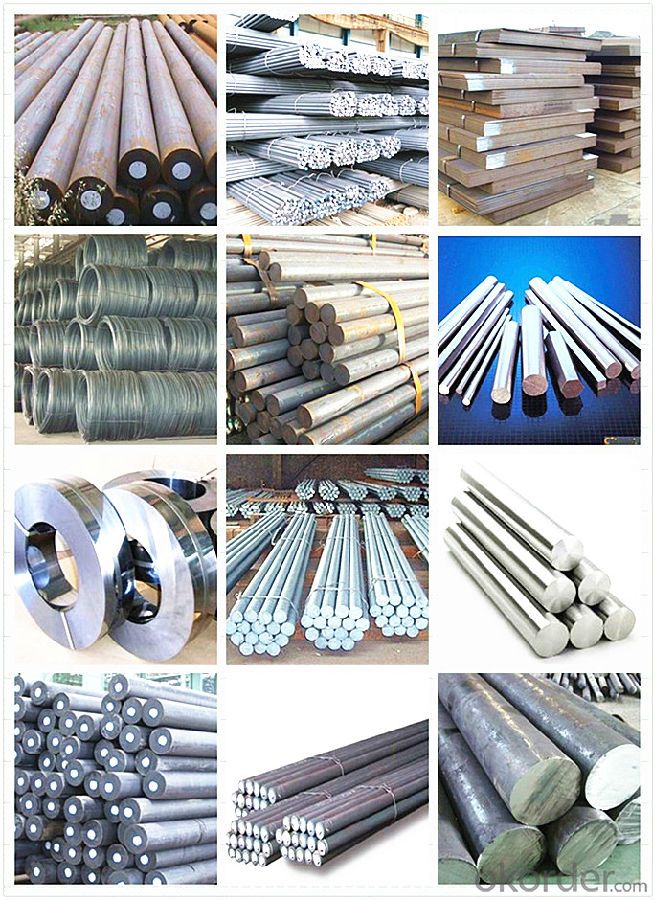
FAQ:
1.Your advantages?
Professional products inquiry, products knowledge train (for agents), smooth goods delivery, excellent
customer solution proposale
2. Test & Certificate?
SGS test is available, customer inspection before shipping is welcome, third party inspection is no problem
3. Factory or Trading Company?
CNBM is a trading company but we have so many protocol factories and CNBM works as a trading department
of these factories. Also CNBM is the holding company of many factories.
4. Payment Terms?
30% TT as deposit and 70% before delivery.
Irrevocable L/C at sight.
5. Trading Terms?
EXW, FOB, CIF, FFR, CNF
6. After-sale Service?
CNBM provides the services and support you need for every step of our cooperation. We're the business
partner you can trust.
For any problem, please kindly contact us at any your convenient time.
We'll reply you in our first priority within 24 hours.
- Q: How is special steel tested for quality and durability?
- Special steel undergoes a series of rigorous processes and tests to assess its quality and durability. These tests are carefully designed to guarantee that the steel meets the necessary standards and can withstand different conditions and applications. One widely used method for testing special steel is the tensile strength test. This test measures the maximum level of stress that the steel can endure before breaking or deforming. To conduct this test, a sample of the steel is subjected to a pulling force until it reaches its breaking point. The outcomes of this test determine the steel's ability to resist external forces and its overall strength. Another crucial test is the hardness test, which determines the steel's durability. This test involves assessing the steel's resistance to indentation or scratching. A sample of the steel is pressed against a hard surface, and the depth of the indentation is measured. The steel's hardness indicates its resistance to wear and deformation. Apart from mechanical tests, special steel is also subjected to various chemical and metallurgical tests. These tests help determine the steel's chemical composition and microstructure, which are vital factors in ensuring its quality and durability. Spectroscopic analysis is used to identify the steel's exact chemical composition, while metallography is employed to examine the steel's microstructure and identify any impurities or defects. Furthermore, non-destructive testing methods are used to evaluate the steel's internal structure without causing any damage. These methods include ultrasonic testing, magnetic particle inspection, and radiographic testing. Ultrasonic testing employs high-frequency sound waves to detect internal flaws or defects in the steel. Magnetic particle inspection uses magnetic fields to identify surface cracks or discontinuities. Radiographic testing, on the other hand, uses X-rays or gamma rays to examine the internal structure and identify any defects that may compromise the steel's quality and durability. Overall, the testing process for special steel encompasses mechanical, chemical, metallurgical, and non-destructive testing methods. Through these tests, manufacturers can ensure that the steel meets the necessary standards and can perform reliably in various applications, ensuring its quality and durability.
- Q: What are the different quality control measures for special steel production?
- Some of the different quality control measures for special steel production include strict material sourcing and selection, thorough testing and inspection during the manufacturing process, adherence to specific industry standards and specifications, regular calibration and maintenance of equipment, proper handling and storage of finished products, and continuous monitoring and improvement of overall production processes.
- Q: What are the properties of high-temperature tool steel?
- High-temperature tool steel possesses properties like exceptional hardness, wear resistance, and high temperature stability. It exhibits excellent strength and toughness at elevated temperatures, making it suitable for applications where tools are subjected to intense heat and stress. The steel retains its hardness and strength even at elevated temperatures, allowing it to maintain its cutting or shaping capabilities. Additionally, high-temperature tool steel has good dimensional stability, ensuring minimal deformation or warping under extreme heat conditions.
- Q: What are the main factors affecting the hardness of special steel?
- The hardness of special steel is influenced by various factors. Let's explore some of the key ones: 1. Carbon content plays a vital role in determining the hardness of steel. The addition of carbon, known as a hardening element, enhances the strength and hardness. Generally, higher carbon content leads to increased hardness. 2. The presence of alloying elements like chromium, manganese, nickel, and tungsten also impacts the hardness of special steel. These elements interact with the steel, forming compounds and solid solutions that enhance hardness and strength. 3. The hardness of steel is significantly affected by the heat treatment process. This involves subjecting the steel to specific heating and cooling cycles. Quenching, a rapid cooling process, transforms the microstructure of the steel, resulting in increased hardness. On the other hand, tempering reduces hardness while improving toughness. 4. The crystal structure of the steel can also influence its hardness. For instance, during quenching, the formation of martensite, a hard and brittle structure, increases hardness. Alternatively, crystal structures like ferrite or pearlite may exhibit lower hardness. 5. The size of grains within the steel's microstructure can impact its hardness. Smaller grain sizes generally lead to higher hardness due to improved strength and limited dislocation movement within the material. 6. Work hardening, which occurs through processes like rolling or forging, can increase the hardness of steel. This phenomenon happens when dislocations in the crystal lattice become trapped and hinder further dislocation movement, resulting in increased hardness. 7. The presence of impurities or non-metallic inclusions in steel can affect its hardness. These impurities can act as stress concentrators, reducing the material's hardness. To achieve the desired hardness for specific applications, it is crucial to consider and carefully control these factors during the manufacturing process of special steel.
- Q: What are the different methods of controlling the grain size in special steel?
- Some of the different methods of controlling the grain size in special steel include thermomechanical processing, alloying elements, grain refinement techniques such as grain size control agents, and heat treatment methods like annealing and quenching.
- Q: What are the main characteristics of spring steel?
- Spring steel is a type of high-carbon steel that is specifically designed to possess excellent elasticity and resilience. It is primarily known for its ability to return to its original shape after being bent or deformed, making it ideal for applications where repeated and controlled deflection is required. The main characteristics of spring steel include: 1. High Yield Strength: Spring steel is characterized by its high yield strength, which refers to the amount of stress it can withstand before permanent deformation occurs. This allows it to bear heavy loads and resist bending or breaking under pressure. 2. Excellent Elasticity: One of the most significant characteristics of spring steel is its exceptional elasticity. It can be flexed, twisted, or stretched without permanently deforming, and once the force is released, it returns to its original shape. This property is crucial for applications requiring constant and repetitive motion. 3. Superior Fatigue Resistance: Spring steel is exceptionally resistant to fatigue, meaning it can endure millions of cycles of stress without failing. This characteristic is crucial for products subjected to continuous and repetitive loads, such as springs in automotive suspensions or industrial machinery. 4. Good Hardness and Wear Resistance: Spring steel is typically hardened to enhance its wear resistance. This allows it to withstand abrasion and deformation under harsh conditions, making it suitable for applications that involve friction or impact, such as cutting tools or automotive components. 5. Excellent Formability: Spring steel can be easily formed into various shapes and sizes, making it highly versatile for different applications. It can be cold-drawn, rolled, or heat-treated to achieve specific mechanical properties, allowing manufacturers to customize its characteristics based on their specific requirements. Overall, the main characteristics of spring steel are its high yield strength, excellent elasticity, superior fatigue resistance, good hardness and wear resistance, and exceptional formability. These qualities make it a vital material in a wide range of industries, including automotive, aerospace, construction, and manufacturing.
- Q: How does special steel contribute to improving product performance?
- Special steel contributes to improving product performance in several ways. Firstly, it offers enhanced strength and durability, making it suitable for applications that require high load-bearing capacities. Secondly, special steel has excellent corrosion resistance, ensuring products remain intact and functional even in harsh environments. Additionally, special steel can be tailored to have specific properties like heat resistance, hardness, or flexibility, allowing manufacturers to design and produce products with superior performance characteristics. Overall, the use of special steel in manufacturing leads to more reliable and efficient products, ultimately enhancing their overall performance.
- Q: How does special steel contribute to the power transmission sector?
- Special steel plays a crucial role in the power transmission sector due to its exceptional properties and performance characteristics. Firstly, special steel is known for its high strength and resilience, which makes it an ideal material for manufacturing various components of power transmission systems. For instance, special steel is widely used in the production of transmission towers, where its strength ensures the stability and durability of the structures, even under extreme weather conditions. Moreover, special steel is highly resistant to corrosion, which is particularly beneficial in the power transmission sector. Power transmission equipment is often exposed to harsh environments, such as high humidity, chemical pollutants, and saltwater exposure, which can accelerate corrosion. By utilizing special steel in the manufacturing process, the risk of corrosion-related failures is significantly minimized, ensuring the reliable and uninterrupted transmission of power. Additionally, special steel offers excellent electrical conductivity, making it an ideal choice for conductors and cables used in power transmission. The efficient transfer of electrical energy is crucial to minimize power losses and optimize the transmission process. Special steel conductors provide low resistance to the flow of electricity, enabling efficient power transmission over long distances. Furthermore, special steel is also utilized in the production of transformers and other electrical equipment used in power transmission. The magnetic properties of special steel make it an excellent material for transformer cores, enabling efficient energy conversion and minimizing energy losses during transmission. In conclusion, special steel contributes significantly to the power transmission sector by offering strength, corrosion resistance, electrical conductivity, and magnetic properties. These properties ensure the reliability, efficiency, and longevity of power transmission systems, ultimately supporting the uninterrupted supply of electricity to industries, businesses, and households.
- Q: Can special steel be used in the production of luxury goods?
- Yes, special steel can definitely be used in the production of luxury goods. Luxury goods often require high-quality materials to ensure durability, exclusivity, and overall premium quality. Special steels, such as stainless steel, alloy steel, or carbon steel, offer various desirable properties that make them suitable for luxury goods manufacturing. For instance, stainless steel is widely used in luxury watches, jewelry, and accessories due to its corrosion resistance, shiny appearance, and ability to withstand daily wear and tear. Additionally, certain alloy steels can provide exceptional strength and toughness, making them ideal for luxury car parts, high-end knives, or designer furniture. The use of special steel in luxury goods not only enhances their aesthetic appeal but also contributes to their longevity and value. These materials can be crafted into intricate designs, allowing manufacturers to create unique, one-of-a-kind products that cater to the discerning tastes of luxury consumers. Overall, special steel offers a wide range of qualities that are highly sought after in the production of luxury goods, making it a preferred choice among designers and manufacturers in this industry.
- Q: How does mold steel resist wear and erosion?
- Mold steel resists wear and erosion due to its high hardness and toughness properties. It is specifically designed to withstand the abrasive forces and friction that occur during molding processes. Additionally, mold steel is often heat-treated to further enhance its resistance against wear and erosion, making it a durable and long-lasting material for mold manufacturing.
Send your message to us
Grade SAE A36 CNBM Carbon Steel Round Bar with High Quality
- Loading Port:
- Shanghai
- Payment Terms:
- TT or LC
- Min Order Qty:
- 3 m.t.
- Supply Capability:
- 10000 m.t./month
OKorder Service Pledge
OKorder Financial Service
Similar products
Hot products
Hot Searches
Related keywords
